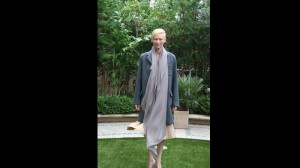Tilda Swinton thought she’d never finish her latest film
LOS ANGELES — Time magazine recently showered her with praise.
Tilda Swinton deserves the gushing prose. The British actress rewards us with yet another towering performance in “We Need to Talk About Kevin,” a dark drama where she plays Eva Khatchadourian, the mother of a child who goes on a murderous rampage at his high school.
Lynne Ramsay directs this film which Tilda playfully referred to as “the feel-good film of the year.”
Often described as ethereal, Tilda has angular features—eyes that burn with intelligence, for instance—and a statuesque frame that make her a head-turner wherever she goes. Fashion designers love this woman, who was the late Princess Diana’s contemporary at an exclusive boarding school.
Tilda’s take on fashion: “It’s about dressing up. I am very fortunate to have a lot of friends who make clothes. And when I wear their clothes, I feel like I’m in a kind of company with them. So I’m very blessed. But when I’m at home, I’m in my son’s clothes because he’s taller than me.”
Article continues after this advertisementIn the Time article, writer Catherine Mayer mentions the actress’ 14-year-old twins, Honor and Xavier, their father John Byrne who is 20 years older than Tilda, her “sweetheart” Sandro Kopp, who is 17 years her junior.
Article continues after this advertisementBelow are excerpts from our interview:
We see in the film how somebody can act one way in front of a person and then behave differently in front of another person. Have you met people like that?
In many ways, that question keeps me wanting to be a performer. When I was about 10, going back to boarding school, I was on this train. I was on a compartment with other people, all adults, and I was sitting there, very composed and thinking, “I am miserable. I am so unhappy. I’m leaving my parents. I’m going off to school but nobody can tell I’m unhappy.”
I’ve been very polite to this lady. I’ve had a little conversation with this gentleman. All these people would say that I was a perfect, composed 10-year-old. None of them would know how unhappy I was. Then I began to fantasize about them. I thought, “What are you thinking?” That question keeps me performing.
You play a character with the stigma of the “bad mother.” How important is physical contact with your kids?
One of the really delightful things about performing is that you get to act out things that are very far from yourself. My experience of motherhood is so completely different that there’s no tangency at all with Eva’s story. My children are angelic. I adore them. They say that if you hug your babies, they grow. Well, my children are enormous.
You come from a distinguished family of Anglo-Scots that goes as far back as the High Middle Ages.
All families are old. One distinctive thing about my family is that it was very lazy and just stayed in one place for a long time. My parents’ and grandparents’ generations were not artists. So when I came along as an artist, it did feel as if I had to make a new world for myself. But the longer I live, the more I study my family and I realize there are artists all over the place. So I didn’t fall far from the tree.
What kind of values are you instilling in your kids?
For a while now, particularly since I’ve lived in the Highlands of Scotland and had children, I have not been involved in any party politics. I haven’t been really involved in any kind of political action mainly because I choose to be absorbed into my family and work.
But my children are my kind of political laboratory. I am very much involved in their education. My children go to a Waldorf Steiner School. I am very involved in trying to build a further program for the school so that they can stay in that project until they’re 18. That’s about as political as my life is these days …
Having said that, for me, art is political. I can’t really imagine it not being political. But beyond that, I have nothing really to add. It’s almost impossible to stay outside of practical politics. I would say that in the Highlands of Scotland, it actually is quite possible, particularly if you have young children.
It’s a deeply political act to put one’s children into a Waldorf School. I’m very proud of our school and that particular movement. It works very well for my family and my children. It’s an alternative schooling which talks about soul values, a child developing at his own rate and developing a socially conscious attitude to the universe, and a feeling of social responsibility. No television, advertising, computers. They are great.
Would you say that this role is the most complex you’ve played?
I certainly feel a completion with this project. This is the fourth one. I have a joke with a friend of mine that we’re going to bring out a boxed set called “The Motherlode” with these four films of mothers. “The Deep End,” “Julia,” “I Am Love,” and this film which are all looking at this predicament of being a mother. I’m very interested in this subject. Not only because I’m a mother but I think mainly because I have a mother. I’m a child of a mother, as we all are.
This film does feel like a completion for me, and I developed it alongside Lynne Ramsay for quite a few years. It was a very difficult film to get made because you can’t imagine people readily giving you money to make something like this. So the fact that we’ve made it is really unimaginable.
E-mail the columnist at [email protected]. Follow him at https://twitter.com/nepalesruben.
